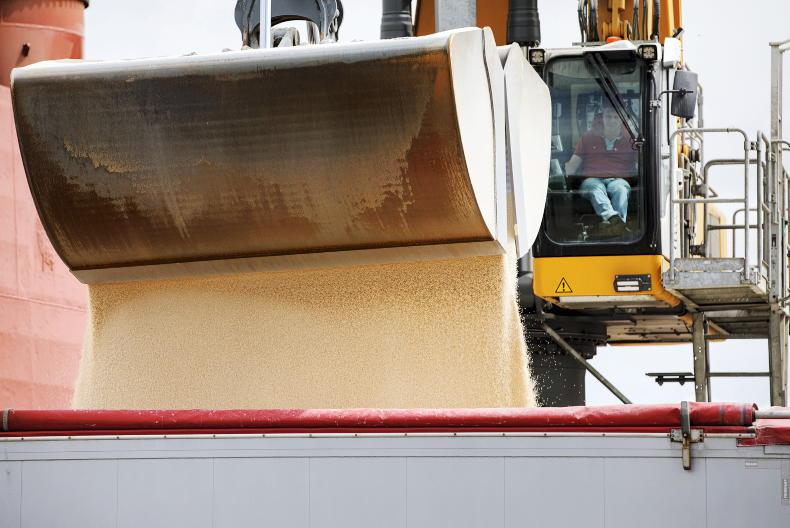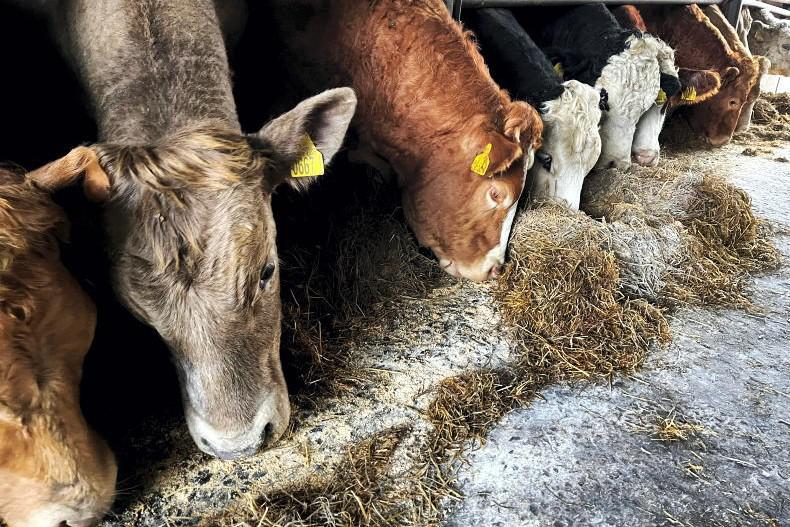A rally attended by over 6,000 NI farmers on Monday evening has given the Ulster Farmers’ Union (UFU) “a mandate” to get planned changes to inheritance tax overturned.
“The one, clear, single message from tonight is that this decision has to be reversed. NI agriculture has spoken,” said UFU president William Irvine.
The event at the Eikon Exhibition Centre heard from representatives from across the political spectrum in NI and all speakers set out their opposition to the UK government’s plans.
“We all stand together for what is right. We want this to be stopped. We want a rethink,” said First Minister Michelle O’Neill.
In her address, deputy First Minister Emma Little-Pengelly urged the UK government to “change course” with its plans for Agricultural Property Relief (APR). “It is wrong, and it must be reversed immediately,” she said.
The controversial changes to APR for inheritance tax were announced in last month’s Autumn Budget and are due to come into effect from April 2026.
It will see a tax-free threshold of £1m for APR and Business Property Relief combined, with a 20% tax rate applying to the value of agricultural assets after that.
Family impact
The UFU rally on Monday evening had many emotive contributions from both the floor and the platform about how changes to APR will affect family farms.
Lorraine Killen from Newbuildings, Co Derry, received a standing ovation when she urged farmers to keep campaigning to get the changes to inheritance tax overturned.
“We will fight for our farms, for our families and for the generations that came before us. And we will fight all the harder for the generations yet to come,” she said.
List of crises
A reccurring theme was that the Autumn Budget is the latest crisis to be added to a long list of issues that are frustrating farmers and threatening the future of farm businesses.
“In recent years, family farms have been under an insurmountable amount of pressure, from a standstill with planning permission, threats to TB payments and mounting environmental regulations,” said Castlederg farmer Jessica Pollock.
APR changes built on disputed figures
The changes to APR for inheritance tax are based on figures from the UK Treasury which are disputed by both farmer representatives and agricultural solicitors.
On Monday, UFU president William Irvine accused the UK government of “twisting the numbers” by continuing to suggest that three-quarters of UK farms will be unaffected by its plans.
“We will be working closely with experts on this matter to prove categorically that the figures government used are completely wrong,” he said.
However, UK government ministers continued to use the same figures to defend the new APR policy on Tuesday as thousands protested in London.
“It is the best starting point we have got. That data is the only data we have got for how many claims were actually made against APR,” said Environment Secretary Steve Reed.
The figures are based on historic claims under APR in the 2021-2022 financial year and suggest around 500 farms every year will be impacted by the proposed changes.
Reed insisted that the projections from the Treasury have considered previous claims that farms made under Business Property Relief, as well as other inheritance tax allowances.
However, many experts still question the Treasury’s calculations and argue that the high value of agricultural land, as well as other assets like livestock and machinery, will mean many more farms will be required to pay inheritance tax.
“A disproportionate number of the three quarters of unaffected claims will be estates of small-scale landowners who do not actually farm the land themselves, and not the estates of actual farmers,” said Peter Brown from the Agricultural Law Association.
At the UFU rally, Brown said many farms availed of “spouse relief” in the past which meant APR did not need to be claimed at all, so these estates are not included in the Treasury’s figures.
“As the proposed APR £1m allowances are not transferrable, each spouse’s estate will have to leave assets to the next generation directly for both estates to claim APR,” he explained.
Agricultural solicitors also suggest that farm valuations used in past APR claims were underestimates because the exact figures did not matter as 100% relief was available in all eligible cases.
“Many believe the government are wrong about this. It is not, as they claim, a tax which will affect only the richest estates,” Brown said.
Exact impact of APR on NI farms is not known
The UK government has not carried out any analysis on how many farms in NI will be impacted by the changes to APR, NI Secretary of State Hilary Benn has said.
“I am not aware that there is a NI specific assessment that has been undertaken,” Benn told the NI Affairs Committee on Tuesday.
DUP leader Gavin Robinson said the inheritance tax changes will have a “disproportionate hit” in NI as more farms are under sole ownership and land values are more expensive than the rest of UK.
Senior civil servant Julie Harrison told MPs that the only assessment for NI was carried out by DAERA after the changes were announced in the Autumn Budget.
The DAERA analysis found 36% of NI farms could be impacted, including 77% of dairy farms, 33% of dry stock farms in less favoured areas, and 28% of lowland cattle and sheep farms.
However, as reported last week, the DAERA analysis is solely based on the value of bare land, and does not include the value of farmyards, dwelling houses, machinery or livestock.
Peter Brown from the Agricultural Law Association told the UFU rally on Monday that the DAERA analysis is “probably an underestimate”.
“The book value of farms in the agricultural census, which is what this comes from, will be significantly lower than the more comprehensive valuations which will be submitted with inheritance tax returns,” he said.
UK tax plans at odds with other countries
The proposed changes to inheritance tax rules for agricultural properties in the UK appears to be at odds with the policies that are in neighbouring countries.
Analysis by the British Agricultural Bureau (BAB) has found that “many EU countries” offer inheritance tax relief by either significantly reducing or fully exempting agricultural assets.
“APR policies are designed not just to support family businesses but also to avoid forcing heirs to sell inherited farms due to high tax burdens,” the BAB analysis states.
In the Republic of Ireland, inheritance tax relief is available which reduces the taxable value of property by 90%.
In France, a 75% reduction in the taxable value of inherited agricultural property is available, although the farm must continue to operate for a minimum of six years.
BAB states that, in Spain, reductions for agricultural inheritance can vary by region, but a 95% reduction is common for family-owned agricultural properties.
The inheritance tax regime is even more generous in Italy where full exemptions on agricultural properties are available if certain criteria are met.
Massive UFU rally is warning to Stormont
Even though the UFU rally on Monday was solely focussed on inheritance tax, the huge turnout will be noted by local politicians who decide important farming policies within NI.
In his contribution from the floor, Warrenpoint farmer Pat McKay said most problems facing NI farmers “are born at Stormont” including ammonia rules which “has planning at a standstill”.
“We eagerly await a TB strategy which I fear will place all the burden and onus on farmers, and will abscond from wildlife intervention,” he said.
In his opening address, UFU president William Irvine said that on top of inheritance tax, there are “many other issues” facing NI farming at present.
“The feeling on the ground is that we may need another rally to address these issues,” he said.











SHARING OPTIONS